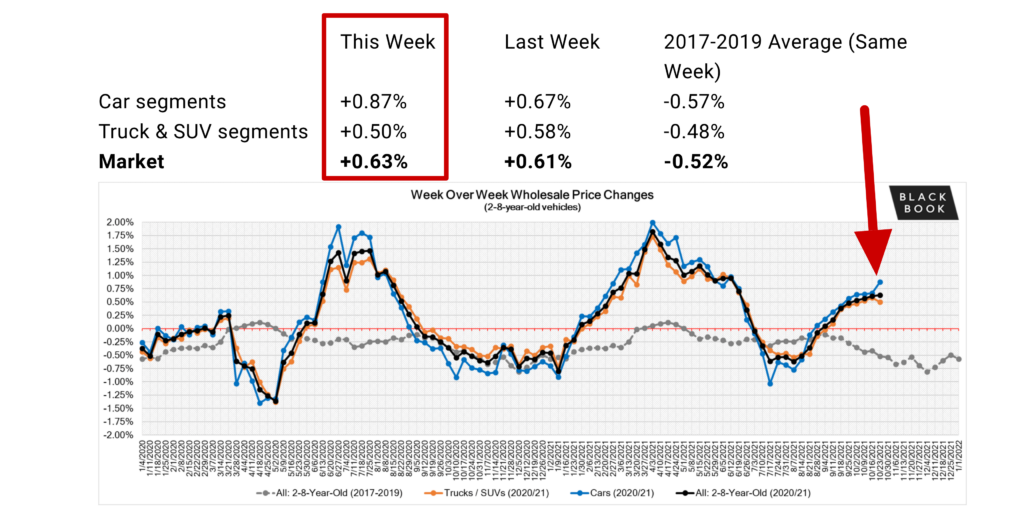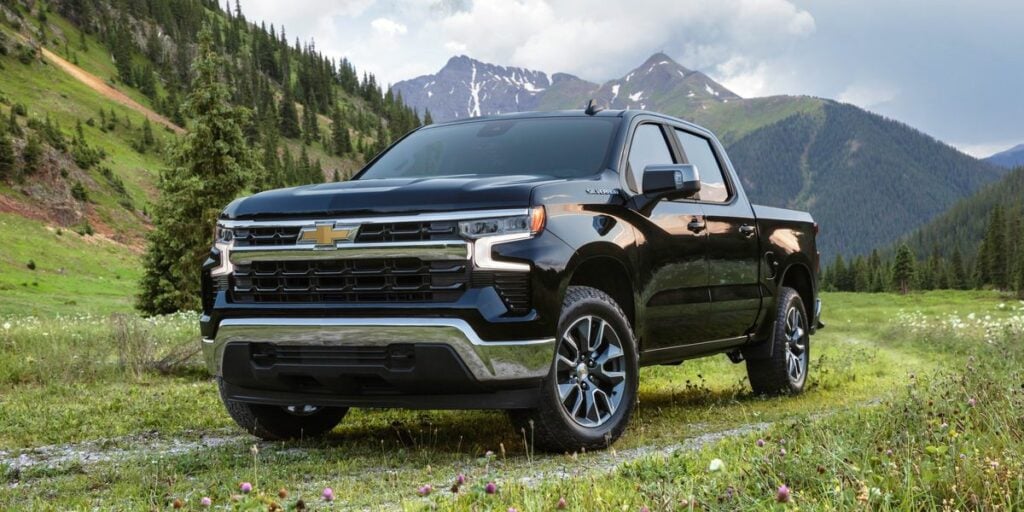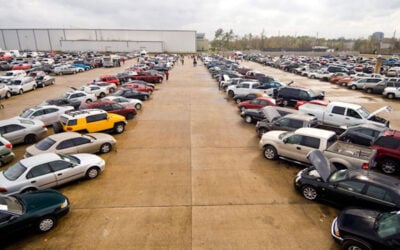Cars, trucks, and SUVs are very expensive right now. New or used, no matter where you look, prices are high. That being said, some brands have experienced larger price increases than others. Today we’ll take a look at the automakers who have seen the largest and smallest increases in new car and used car prices. Buckle up, it’s a pretty wild ride.

For each table we’ll be looking at the increase in price year-over-year. For example, when you see “Chevrolet” and “39.1%” that means that the average price of Chevrolet’s inventory has increased 39.1% from this time last year to today. We told you to buckle up …
Let’s dive in.
Brands That Have Increased The Most – New Cars, Trucks, and SUVs

The new car market is in disarray. Every major automaker is struggling to produce enough vehicles to keep up with demand. Who is hurting the most? It appears to be Chevy.
| Brand | Year-over-Year Percent Change |
| Chevrolet | 39.10% |
| Jeep | 35.30% |
| Dodge | 33.30% |
| Nissan | 29.90% |
| Buick | 26.20% |
| Cadillac | 24.70% |
| GMC | 24.30% |
| Chrysler | 24.00% |
| Kia | 23.70% |
| Mitsubishi | 23.50% |
There’s your top ten, ladies and gentlemen. And yes, that data is accurate. The average selling price of a new Chevrolet right now is 39.1% higher than it was this time last year. Jeep comes in at number two on the list with a 35.3% gain year-over-year, and Dodge rounds out the top three with a 33.3% increase in price.
In case it wasn’t clear, GM has struggled mightily in 2021. For the first time ever, GM lost their US sales crown to Toyota. It’s no wonder the price for a new GM product has gone up so much, however these numbers are seriously incredible.
Brands That Have Increased The Least – New Cars, Trucks, and SUVs

What about on the opposite end of the spectrum? Which automakers have seen their new vehicle prices increase the least?
| Brand | Year-over-Year Percent Change |
| MINI | 0.00% |
| Mercedes-Benz | 0.20% |
| Lexus | 0.50% |
| Lincoln | 2.40% |
| Audi | 3.10% |
| RAM | 4.10% |
| BMW | 4.70% |
| FIAT | 5.00% |
| Acura | 5.50% |
| Subaru | 6.00% |
Mini comes in at the number one spot, with their new car inventory prices being level with this time last year. Mercedes-Benz and Lexus round out the top three with their less than 1% increase year-over-year.
Thinking about buying an extended warranty? Get a free quote from CarEdge first!
The biggest surprise on the list may be Subaru. Subaru has some of lowest days supply of inventory in the industry right now, however their new inventory prices have only gone up 6%.
Brands That Have Increased The Most – Used Cars, Trucks, and SUVs

For many, the thought of buying a new car has gone out the window because new vehicle prices are simply too expensive. That leads us to wonder what is going on with used vehicles? Which automaker has seen their used inventory appreciate the most? Volkswagen.
| Brand | Year-over-Year Percent Change |
| Volkswagen | 34.40% |
| Hyundai | 31.50% |
| Toyota | 31.10% |
| Lincoln | 30.60% |
| Kia | 30.60% |
| Dodge | 29.70% |
| Chevrolet | 28.90% |
| Cadillac | 28.00% |
| Ford | 26.70% |
| Nissan | 24.70% |
The average used Volkswagen has increased in price 34.4% year-over-year. Hyundai and Toyota round out the top three, with 31%+ increases as well. One brand we were surprised not to see on this list was Mitsubishi. The Mirage is the fastest appreciating used car on the market right now.
If you’re going to buy a used car, we strongly suggest you get a pre-purchase inspection and consider a free extended warranty quote from CarEdge. These prices are insane, and the best thing you can do is get some peace of mind when spending so much money.
Brands That Have Increased The Least – Used Cars, Trucks, and SUVs

Which brands have seen their used car prices increase the least? Jaguar!
| Year-over-Year Percent Change | Year-over-Year Percent Change |
| Jaguar | 5.00% |
| Mazda | 11.60% |
| INFINITI | 13.00% |
| BMW | 13.50% |
| Land Rover | 14.10% |
| Audi | 15.10% |
| Alfa Romeo | 16.00% |
| Mitsubishi | 16.00% |
| Lexus | 16.30% |
| Chrysler | 17.90% |
Used Jaguar’s are only 5% more expensive today than they were this time last year. Mazda and INFINITI round out the top three. Seeing Mazda on this list (especially when Toyota and Hyundai are on the other) makes you think that buying a used Mazda right now might make more financial sense then splurging on a Toyota or a Hyundai.
The Complete List of Price Changes For All Brands
This section is best viewed on a laptop or desktop!
| Brand | Year-over-Year Percent Change – New | Year-over-Year Percent Change – Used |
| Chevrolet | 39.10% | 28.90% |
| Jeep | 35.30% | 21.70% |
| Dodge | 33.30% | 29.70% |
| Nissan | 29.90% | 24.70% |
| Buick | 26.20% | 18.70% |
| Cadilac | 24.70% | 28.00% |
| GMC | 24.30% | 22.70% |
| Chrysler | 24.00% | 17.90% |
| Kia | 23.70% | 30.60% |
| Mitsubishi | 23.50% | 16.00% |
| Mazda | 22.30% | 11.60% |
| Hyundai | 20.80% | 31.50% |
| Volkswagen | 18.90% | 34.40% |
| Ford | 15.60% | 26.70% |
| Toyota | 14.50% | 31.10% |
| INFINITI | 11.40% | 13.00% |
| Honda | 8.00% | 24.40% |
| Alfa Romeo | 7.90% | 16.00% |
| Land Rover | 6.90% | 14.10% |
| Jaguar | 6.30% | 5.00% |
| Subaru | 6.00% | 18.30% |
| Acura | 5.50% | 20.10% |
| FIAT | 5.00% | 18.80% |
| BMW | 4.70% | 13.50% |
| RAM | 4.10% | 23.40% |
| Audi | 3.10% | 15.10% |
| Lincoln | 2.40% | 30.60% |
| Lexus | 0.50% | 16.30% |
| Mercedes-Benz | 0.20% | 23.20% |
| MINI | 0.00% | 20.00% |









![10 Cars with the Lowest Cost of Ownership [2026 Data]](https://caredge.com/wp-content/uploads/2026/02/2026-Toyota-Corolla-Hatchback-400x250.png)




Your headers that begin with “Brand’s” should be “Brands”
Thanks! That’s what I get for writing too early!
What’s the value on vw Tiguan’s at the moment 2021
Apparently Tesla does not exist.
I wish we had data for them!
Can’t you just look at their website? Their price is non negotiable
So, are you saying the MSRP has increased this much since last year? It’s hard to imagine.
No, the average selling price. We anticipate MSRP increases to be larger than usual this coming year, but no confirmation on that yet.
Are Acura Mdx up in value? I’ve gotten some offer prices online,, but I’m still under lease. Deciding to buy it or not, since Acura isn’t allowing lease sales to anyone but their own dealers.
It’s not clear to me why big price increases mean a brand is having trouble. Normally I’d say that if a brand is able to raise its price the brand is doing well. Sure, the brand could be having trouble with supply, but even if they’re in short supply, why would the price go up unless there is strong demand for the brand?
Thanks for the info here, very interesting and much appreciated. Hope all is well.
-Sam
The data doesn’t mean the price of an equivalent Chevy has gone up 39.1%, model for model. It means that the average Chevy that is sold (with more Suburbans that Equinox being sold ) is 39.1% more expensive. GM is really short of chips, so it is using the chips it has in its more expensive models, thereby increasing the “average” cost in each brand. There is certainly an increase in MSRP and a reduction in incentives, but a lot of the change is due to different product mix for each brand. MB was already weighted toward expensive models and low incentives, so the average cost of MBs or BMWs didn’t change much.